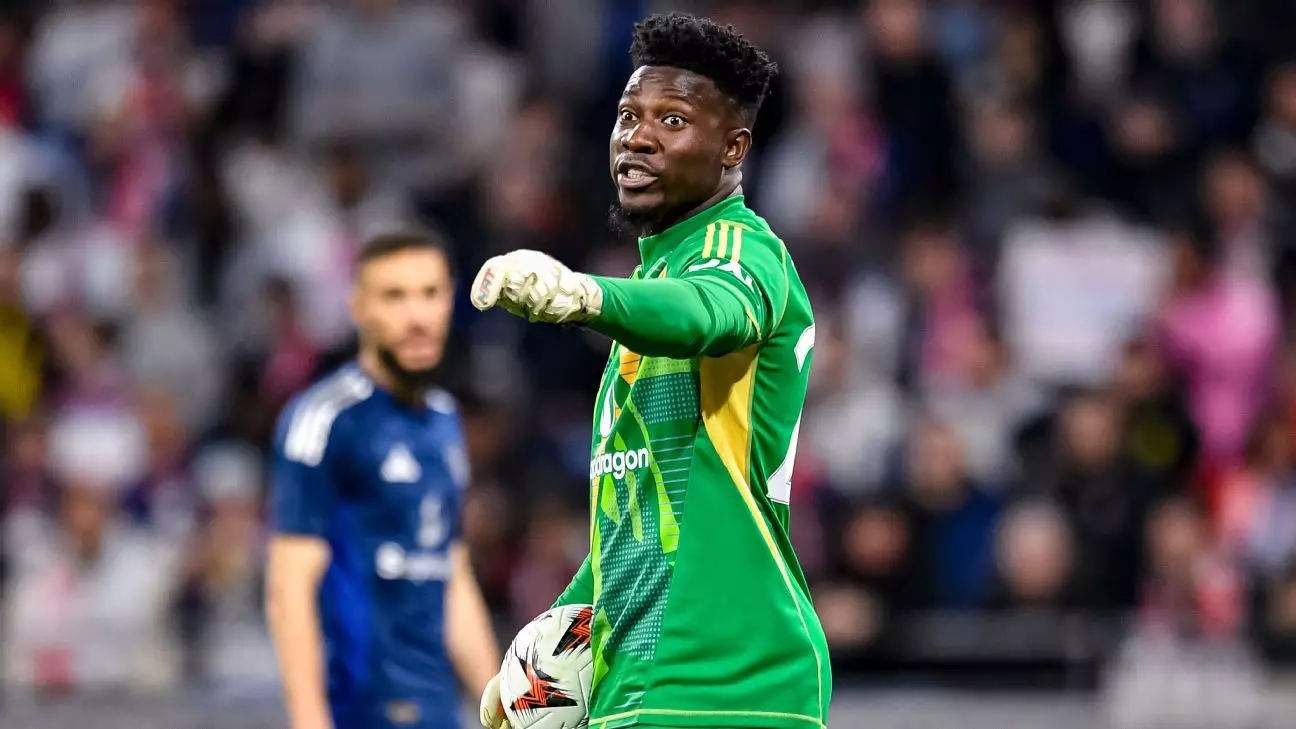In the high-stakes arena of European football, where every error can reverberate through time, the match between Lyon and Manchester United in the UEFA Europa League offered a dramatic narrative of triumphs and blunders. The finale stood at 2-2, but the real story lay beneath the surface, within the costly missteps of Cameroonian goalkeeper André Onana. His two glaring errors not only enabled Lyon to claw back into the game but also laid bare the scrutiny facing him as one of the central figures in the tie. Just a day before, Onana had ignited tensions by suggesting that Manchester United significantly outclassed Lyon—a bold claim that backfired spectacularly.
Matić’s biting retort was not about the match alone; it was personal and strategic, aimed at undermining Onana’s confidence, and the ensuing battle played out dramatically on the pitch. Mistakes by a goalkeeper are often magnified in importance, and for Onana, this match was no trivial encounter; it marked a significant point in his United career.
Unsupported by History
As Onana prepared for the match, the weight of historical criticism loomed large. Dismissed in the media as “one of the worst goalkeepers in United’s history,” his performance was expected to be both a redemption arc and a source of vulnerability. While teams often shift blame across the squad, the goalkeeper carries the burden uniquely, standing isolated in moments of chaos. Onana’s assertion that Manchester United was “way better” than Lyon seemed misguided in hindsight, exposing a dangerous hubris that only heightened the stakes for him during the match.
In the Groupama Stadium, the physicality of the crowd’s hostility was palpable. Hushed disdain turned to open mockery, and when Onana conceded, the cheers from the stands spoke volumes. Here lies the peculiar paradox of goalkeeping: the position is as much about mindset and psychological resolve as it is about technical prowess. For a goalkeeper struggling to maintain confidence amid criticism, every whistle and cheer becomes a thorn; every goal conceded, an open wound.
The Fight for Redemption
Ruben Amorim’s analysis of the match highlighted an underlying truth in football fandom: players are human and prone to mistakes. His philosophical approach to Onana’s performance—”It can happen”—cuts both ways. While acknowledging that errors are part of the game, it leaves the door open for criticism to pile up when they become a recurring theme. His comment on needing focus and change is telling; Amorim understands that to operate at the highest level, the psychological state of the squad, particularly that of their goalkeeper, must be addressed.
While Amorim adeptly handled questions about his goalkeeper, the burden of that performance remained heavy on Onana’s shoulders. Despite a display from the team that suggested potential for victory, Onana’s failings continually drew the headlines. His coach may see the potential for improvement, but for fans, and perhaps for club management, the cost of that potential continues to weigh against tangible results.
Drama in the Penalty Area
As the match unfolded, contrasting narratives emerged between individual players and their collective effort. Manchester United, despite their struggles during the contest, found the back of the net—two times, to be exact. But for all the hope of a late victory, joy gave way to frustration when Cherki equalized in stoppage time. Here, the stakes heightened even further, shifting from a display of individual technique to highlighting the inevitability of collective accountability.
Just as Onana’s blunders pointed to personal failures, the overall performance of Manchester United revealed a larger systemic issue. Rasmus Hojlund’s struggle for form alongside the team’s inability to capitalize on chances reflects not just individual inconsistency but perhaps a failure to effectively combine talent into coherent gameplay. United had periods of control but often struggled to maintain offensive momentum, leaving a sense of missed opportunity hanging in the air.
Navigating the Future Ahead
The upcoming second leg at Old Trafford looms large. The culmination of this two-legged tie may very well determine not just the fate of the season for Manchester United but also the trajectory of André Onana’s career with the club. The misconceptions he created could either be addressed with a powerful comeback or become a constant reminder of an inability to rise above self-created challenges.
As each side prepares for a potential decider, Onana will carry with him the lessons imbued by this match, navigating a path that could either lead to redemption or further scrutiny. The battle against Lyon has emerged as a defining chapter—not just in the narrative of this season, but perhaps in the storied annals of his career. Football, unforgiving in its demands, requires boldness, yet equally so a strategic quietude, and moving forward, Onana must channel both to emerge victorious amidst the cacophony of doubt.


Leave a Reply